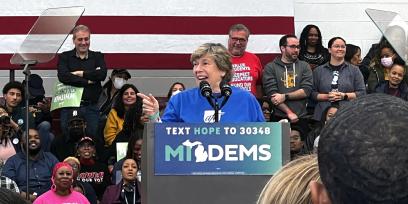IN NOVEMBER’S ELECTIONS, Americans chose freedom and democracy over MAGA extremism and fear mongering. The results showed a deep well of support for the promise and potential of public education and for the sustained investment that parents want to help their kids thrive. Because of our votes, states like California, Massachusetts, New Mexico, and even Florida passed ballot measures and funding boosts. And governors who ran on these issues largely won.
Young people voted in historic numbers for their futures—for fixing the climate crisis, for freedom from gun violence and election deniers, for reproductive and LGBTQIA+ rights, and for economic security, including student debt relief. (By November, almost 26 million Americans had applied for student loan forgiveness.) In Florida, 25-year-old Maxwell Alejandro Frost ran on these issues and became the first Generation Z member elected to Congress.
Gun violence—this American Educator’s cover story—was a key issue for young voters. In the United States, it’s the leading cause of death for children and teens (unlike our peer countries, where vehicle accidents and cancer are to blame), with roughly 4,000 killed and more than 15,000 wounded every year.
While I had fire drills as a kid, children now go through active shooter drills. As I was visiting St. Louis’s Central Visual and Performing Arts High School, where a teacher and student were gunned down by a former student, news broke of the shooting at the University of Virginia. That’s two more schools—on top of at least 66 others this year—reeling from shootings.
The AFT has long fought for safe and welcoming schools; that starts by eradicating gun violence in our schools and communities. We’re partnering with Teachers Unify to End Gun Violence, a grassroots group founded by three courageous AFT members, to win sensible gun reforms. That includes red flag laws, which would have saved lives in St. Louis, where the shooter’s mother asked police to take his gun away. We’re also fighting for more community schools and more mental health care—like the Biden administration’s $1.7 billion federal investment in mental health supports for schools and communities—so troubled youth like the St. Louis shooter don’t “slip through many cracks,” as a teacher who knew him wrote.
We know what won’t work: arming teachers. We need fewer guns in our schools, not more. As Everytown for Gun Safety writes in this issue, “Supportive and trusting school environments are the strongest way to prevent school violence.” Voters want our country to come together around caring for our kids; that’s why they elected progressive problem solvers.
In Michigan, Gov. Gretchen Whitmer made the largest investment in K–12 education in state history. She also created nearly 25,000 auto jobs, championed reproductive freedom, and supported secure gun storage and red flag laws. Her opponent—NRA- and Trump-endorsed/DeVos-funded Tudor Dixon—ran on culture wars (like excluding transgender athletes) and school vouchers. Dixon opposes abortion (even for rape or incest) and red flag laws. Whitmer won.
In Wisconsin, Gov. Tony Evers made historic investments in public education. A science teacher who became the state superintendent, Evers delivered the first special education funding increase in a decade. He also vetoed GOP bills to expand concealed-carry rights and is championing efforts to repeal Wisconsin’s 1849 law criminalizing abortion. Evers’s opponent, Trump-endorsed Tim Michels, called increasing school funding the “definition of insanity,” opposes red flag laws, and is against reproductive freedom. Evers won.
In New York, Gov. Kathy Hochul made record investments in healthcare, education, infrastructure, and the environment. She won $100 million to help schools deal with pandemic fallout, including mental health services. She signed nation-leading pro-choice legislation and funded community-based gun violence interventions. Her opponent, NRA- and Trump-endorsed Lee Zeldin, wanted to restrict how race is taught in schools, supported education vouchers, and voted for defunding Planned Parenthood and against the Assault Weapons Ban. Hochul won.
In Arizona, Katie Hobbs, a former social worker serving as Arizona’s secretary of state, focused on ensuring reproductive rights, preserving democracy, supporting public education (including more school counselors), and demanding common-sense gun safety. Opponent Kari Lake, a Trump-endorsed election denier, favors school vouchers, wants to end social and emotional learning, and rejects any restrictions on gun ownership. Hobbs won.
Our country remains deeply divided, and we didn’t win all the races we hoped to win. But these expectation-defying midterms sent a message that Americans reject election deniers and extremists—and want pathways to a better life like public education and freedom, including freedom to make reproductive choices and freedom from violence. Now let’s keep fighting for what kids and communities need to thrive.
[Photo by Alex Palombo]

